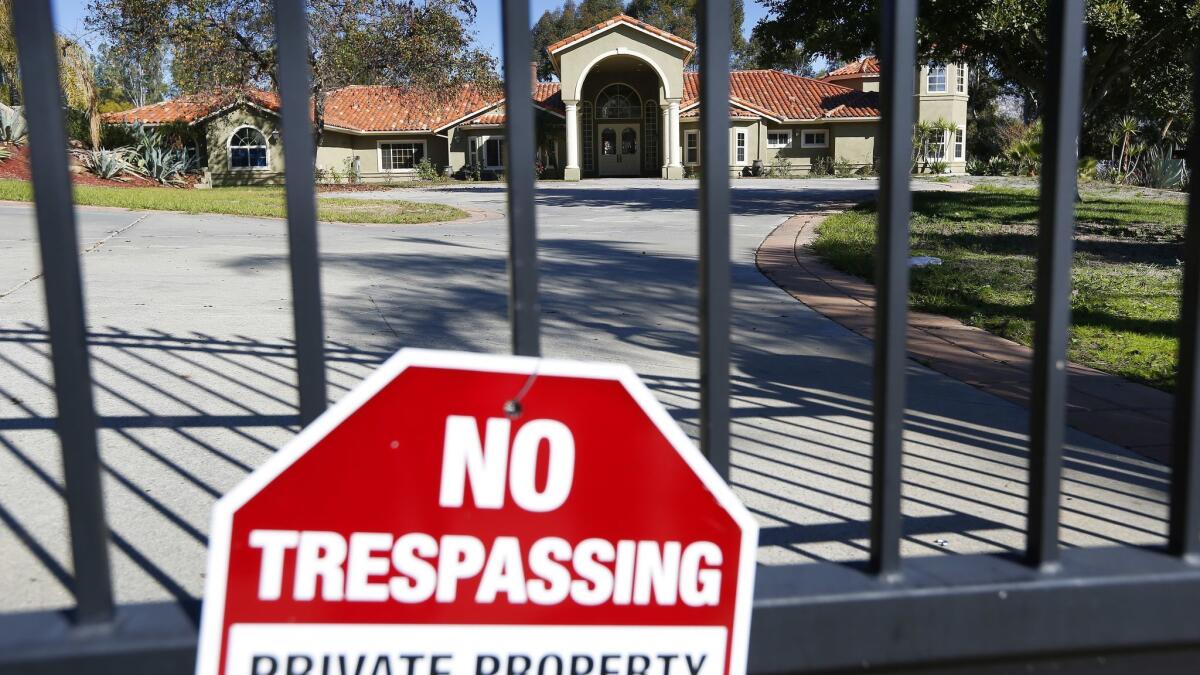Stealing home? Tony Gwynn’s former estate has apparently been occupied by a squatter

- Share via
Reporting from Poway, Calif. — Neighbors of the late San Diego Padres great Tony Gwynn noticed something strange happening in their upscale Poway neighborhood about two weeks ago.
The Gwynn family lost the home to foreclosure last summer, and it’s been vacant since. But in late December, neighbors told the San Diego Sheriff’s Department, they noticed people coming and going from the fenced-off multimillion-dollar residence. One neighbor spotted barrels being loaded into the garage, leading to speculation that a methamphetamine lab might be setting up.
Now officials with the management firm responsible for the bank-owned property have confirmed that the man living in the house is a squatter and civil eviction proceedings have been started against him.
Valued at about $2.3 million, the house is now owned by a New York bank and managed by Ocwen Financial Corp. in Florida. Ocwen spokesman John Lovallo confirmed that it has taken action to evict the man.
Ocwen “recently was made aware that an unauthorized person was occupying the property,” Lovallo said. “We are currently investigating ... and will take all necessary steps under the law to remove an unauthorized person(s) from the property. We will cooperate with local authorities on this matter.”
Last weekend, a Poway Sheriff’s Department sergeant made contact with the man. He told the sergeant that he had the legal right to be there but indicated he would be moving out. The man, who officials have not named because he has not been arrested, refused to comment when approached by a reporter at the locked gate of the home.
On Tuesday, there were three vehicles parked in the home’s driveway. But on Wednesday, there were none and by late afternoon, the padlock and chain the resident was using to secure the property had been removed and a new one had replaced it.
Sheriff’s officials say they are limited in what they could do without authorization from the home’s owner.
“We want to address the neighbors’ concerns, but we can’t just knock down the doors,” Poway Sheriff’s Lt. Christopher Collier said. “There are laws that we have to abide by and facts that have to be checked out.”
Collier said the man said he had paid $24,000 to lease the house for a year. Neighbors told deputies the man’s story of how he had come to be in the house had changed over the past few weeks.
“He is claiming he has the right to be there, but he also doesn’t seem to want to be in the middle of this and is saying he will move out,” the lieutenant said.
Bob Manis, the city’s director of development services, who oversees Poway’s code compliance team, said the city also received complaints. He also said one of the worries concerned the barrels being moved into the garage.
Manis said that as far as the city is concerned, there have been no code violations. Electricity, cable and gas had been turned on at the house in recent weeks, authorities said, but apparently there is no trash service. Should trash begin to pile up, then code compliance officers could take action, Manis said.
The 7,630-square-foot, six-bedroom, six-bath house was built by Gwynn and was the family’s home from 1991. Gwynn, a Long Beach Poly High School star who went on to become the San Diego Padres’ greatest hitter and a member of baseball’s Hall of Fame, died in 2014 at age 54 after battling cancer. His widow, Alicia, still lived in the house at the time of the foreclosure.
Collier said the man told him that he had been there for more than two months. The lieutenant said squatter cases are legally problematic.
“It’s not like we can go to a house if someone’s been there a month or two, knock on the door and say you’re not living here lawfully and you’re under arrest,” Collier said. “It becomes a civil process.”
So-called squatter’s rights in California can be complicated. One of the ways a person can get possession of a property is if they have openly occupied the home for at least five years and act the way an actual owner would. That might involve paying property taxes or a homeowner association fee, and making repairs to the property.
Rent is a little different. If the tenant paid rent for five years, and then tried to claim possession the month after stopping paying rent, he or she would have no claim, said an analysis of the law by the Legal Beagle website. But, if they stopped paying rent five years ago and stayed the whole time, then a legal case could be more difficult.
J. Harry Jones and Phillip Molnar write for the San Diego Union-Tribune.
More to Read
Sign up for Essential California
The most important California stories and recommendations in your inbox every morning.
You may occasionally receive promotional content from the Los Angeles Times.















